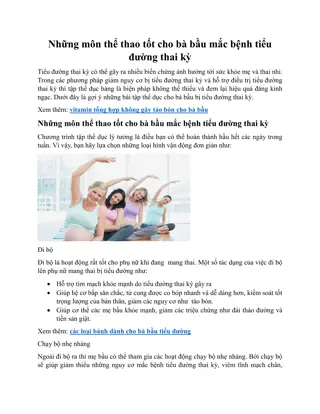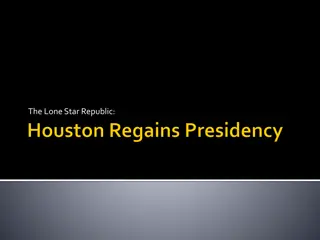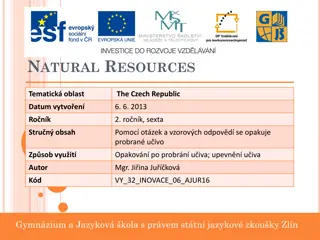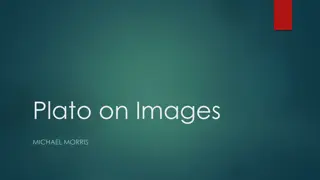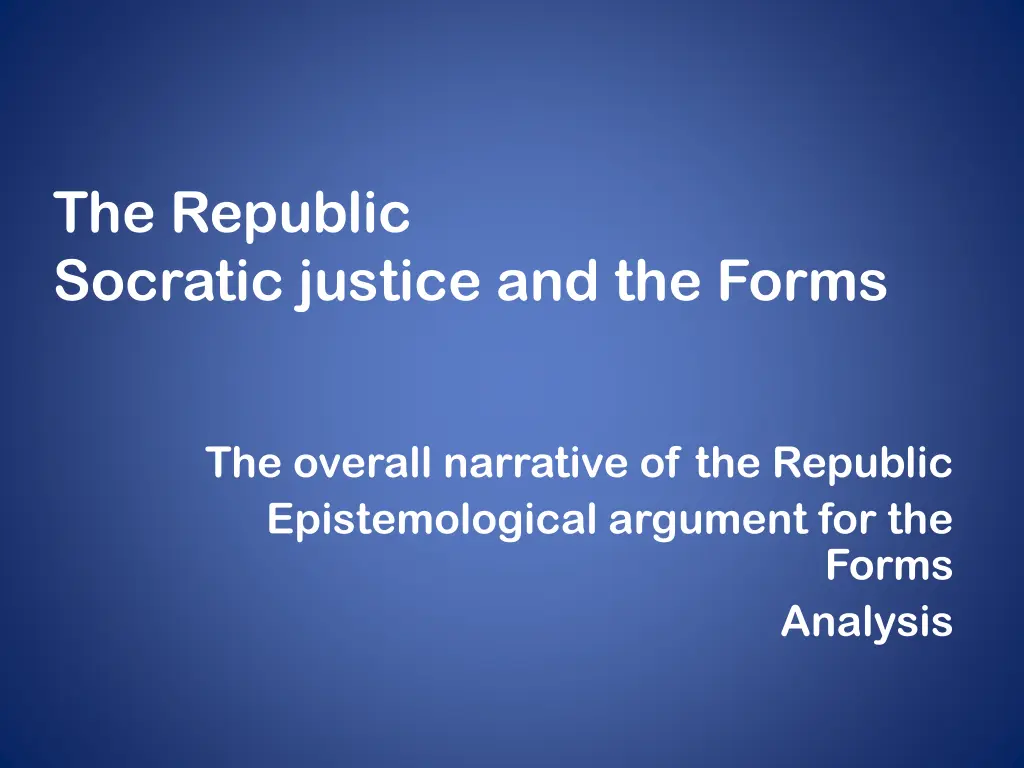
Socratic Justice and the Forms Analysis
Explore the narrative of The Republic focusing on Socratic justice, the Forms, and the epistemological argument. Delve into the tripartite structure of the psyche, concepts of self-mastery, psychic harmony, and the challenge posed by Thrasymachus, Glaucon, and Adeimantus. Witness Socrates' endeavor to link his definition of justice to unjust actions while contemplating the transformative power of philosophy in society.
Uploaded on | 0 Views
Download Presentation

Please find below an Image/Link to download the presentation.
The content on the website is provided AS IS for your information and personal use only. It may not be sold, licensed, or shared on other websites without obtaining consent from the author. If you encounter any issues during the download, it is possible that the publisher has removed the file from their server.
You are allowed to download the files provided on this website for personal or commercial use, subject to the condition that they are used lawfully. All files are the property of their respective owners.
The content on the website is provided AS IS for your information and personal use only. It may not be sold, licensed, or shared on other websites without obtaining consent from the author.
E N D
Presentation Transcript
The Republic Socratic justice and the Forms The overall narrative of the Republic Epistemological argument for the Forms Analysis
Last lecture Tripartite structure of the psyche: Principle of opposition Reason and the appetites (e.g. thirsty man) Thumos (e.g. Leontius) Justice = psychic harmony Justice describes as notes on a scale Kalon = beautiful, honourable, morally praiseworthy Self-mastery = an integrated soul Psychic disharmony = civil war Physical and mental health
Answering the challenge Thrasymachus: it pays to be unjust. Glaucon/Adeimantus: justice is only good for its consequences Socrates has to prove that it pays to be just because justice is good in itself well as for its consequences good in itself as
Answering the challenge Socrates has to link his definition of justice (= psychic harmony) to show that someone wouldn t behave unjustly in the conventional sense (e.g. stealing, cheating, raping, embezzling etc.). Cf. 442-443: Socrates is aware of this.
Answering the challenge Socrates doesn t connect his definition of justice to these unjust actions in Book 4. First has to establish what the philosophic soul is like (being ruled by reason = to live a life ruled by knowledge of the Forms). Cf. 581-595: different kinds of soul and the corresponding states.
Socrates: Socrates: I think we can show that the transformation can be effected by a single change, but it s hardly a small or easy one, though it is possible I m now facing what we called the biggest wave. I ll tell you what it is, even if it swamps me in a surge of laughter and I m drowned in contempt
Socrates: Socrates: The society we have described can never grow into a reality or see the light of day, and there will be no end to the troubles of states, or indeed, my dear Glaucon, of humanity itself, till philosophers become kings in this world, or till those we now call kings and rulers really and truly become philosophers, and political power and philosophy thus come into the same hands, while the many natures now content to follow either to the exclusion of the other are forcibly debarred from doing so. This is what I have hesitated to say so long, knowing what a paradox it would sound; for it is not easy to see that there is no other road to real happiness either for society or the individual. (473c-e).
The existence of the Forms is a metaphysical claim (i.e. the study of what is ), but it s driven by an epistemological need. Epistemology, is the branch of philosophy that examines what we know and how we know it. Socrates argues that an object of knowledge must be stable, and because there is nothing that is stable in this world , there must be another realm in which objects of knowledge exist. Glaucon wants to know who the philosophers are (note: it s a relatively new term). Lovers of sights and sounds vs. lovers of wisdom Cf. the difference between opinion (or beliefs) and knowledge
Socrates Socrates: Does a man who knows, know something or nothing? You answer for him. Glaucon Glaucon: I shall answer that he knows something. Socrates Socrates: Something which is, or which is not? Glaucon Glaucon: Something which is; how could he know something that was not? Socrates Socrates: Then are we satisfied that, whichever way we look at it, what fully is is knowable, what in no way is is entirely unknowable (476e-477a).
Socrates Socrates: Good. Then if there is anything whose condition is such that it both is and is not, would it not lie between what absolutely is and what altogether is not. Glaucon Glaucon: It would. Socrates Socrates: Then since knowledge is related to what is, and ignorance, necessarily, to what is not, we shall have to find out whether to what lies between them there corresponds something between ignorance and knowledge, if there is such a thing (477a).
Socrates Socrates: Each therefore has a different natural field and a different capacity But, of course, knowledge is related to what is; it knows what is as it is while the characteristic of opinion is to form opinions Glaucon Glaucon: If different faculties have different natural fields, and belief and knowledge are two separate faculties, as we maintain, then it follows that the fields of knowledge and opinion must be different. Socrates Socrates: Then if the field of knowledge is what is, the field of opinion must be something other than what is. (478a)
Socrates Socrates: Now we said before that if there was anything that appeared both to be and not to be, it would be of a kind to lie between what fully is and what absolutely is not, and would be correlated neither with knowledge nor ignorance, but with what appears to be between them. And we now see that what we call opinion occupies that intermediate position It remains for us to discover something that has its share both of being and not-being, and cannot be said to have the characteristics of either without qualification (478d-e)
Socrates: Socrates: Having established these principles, I shall return to our friend who denies that there is any beauty in itself or any eternally unchanging form of beauty, that lover of sights, who loves visible beauty but cannot bear to be told that beauty is really one, and justice one, and so on I shall return to him and ask him, Is there any of these many beautiful objects of yours that may not also seem ugly? Or of your just and righteous acts that may not appear unjust and unrighteous? (479a)
Recap: argument for the theory of the Forms Metaphysical claim about the realm of the Forms But it is driven by an epistemological need Knowledge requires stable objects But no such objects exist in the phenomenal world (cf. influence of Heraclitus and Cratylus) Objects in this world are objects of opinions (they both are and are not) Therefore, there must be another metaphysical realm beyond this world
Problems with Platos argument for the Forms Can there be different degrees of being in the existential sense? Do faculties have to be distinguished by different fields of reference? Is it okay to slide from an existential to a predicative sense of the verb to be ? Is it okay to say everything in this world can be relative, nothing can be an object of knowledge. What does it mean to participate in, or imitate , the Forms? If the things of this world are so different from the Forms how can they share in them?







